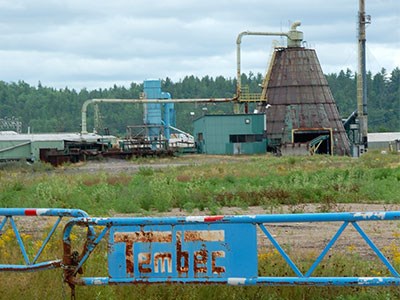A shuttered former Tembec sawmill in Mattawa has been sold to a southern Ontario green-tech startup company.
The Mattawa-Bonfield Economic Development Corporation (MBEDC) announced that the BioNorth Technology Group led by Frank Benincasa, a former construction executive who’s dived into the biodiesel sector, acquired the 187-acre mill property in August.
“It’s a very experienced team that’s multi-faceted in different industries including engineering and business management,” said economic development director Jeff McGirr, who announced the news at the Canadian Bioenergy Association’s annual conference in Thunder Bay, Sept. 10.
An MBEDC press release stated BioNorth plans to establish a “range of related businesses” on the property and develop partnerships with other companies and organizations for an “integrated symbiotic approach.”
McGirr was reluctant to get into detail on the company’s vision for the property, the timelines involved, or how the development will come together since there are a number of moving parts involved.
“There isn’t much I can say publicly at this point. We’re being pretty careful not to make any large commitments about exactly what will happen. There are a number of different components that are in the works right now.”
Talks are underway with other companies and more news will be forthcoming this fall, he said.
Whether or not Benincasa has a biodiesel refinery in mind, his company needs a minimum of 50,000 cubic metres of fibre annually, said McGirr, particularly softwood.
The fibre allotment from area forest management units that was once attached to the Tembec mill was redistributed to other users through the province’s Crown wood competition.
“However, it’s our priority to create jobs and to see that allocation returned to the community,” which was one of the reasons behind attending the CanBio conference, featuring a who’s who of public and private sector players in the bioeconomy, said McGirr.
McGirr said he’s been led to believe that a significant amount of fibre remains unused on the nearby Nipissing unit.
The property located on Highway 17, just west of Mattawa, contains 80,000 square feet of covered manufacturing space that, McGirr said, is in “relatively good shape” with a maintenance garage, an intact sawmill, and a weigh scale.
Some cleanup and prep work is already taking place at the site.
Hopefully, the arrival of BioNorth will produce a much better result than the failure associated with the mill’s previous owner, BioSila.
After Tembec ceased operations in 2008, the MBEDC purchased the mill for $1 and later flipped it to BioSila, a Toronto wood pellet proponent, in 2010 with ambitious plans to sell a biomass product to U.S. customers for power generation. But BioSila couldn’t secure any Crown wood from the province. The company went bankrupt and the property went into receivership two years ago.
The EDC has been heavily marketing the property ever since until BioNorth contacted them six months ago.
McGirr said the company had been scoping out a number of other abandoned or closed mill properties in Northern Ontario before settling on Mattawa.
He added it’s too early to talk about jobs, but the company will utilize the area’s experienced labour pool in fibre manufacturing and will need some highly skilled professional talent as well.




